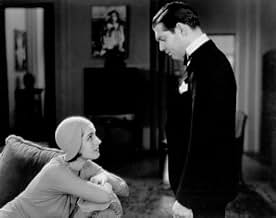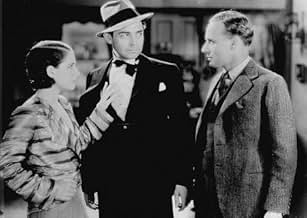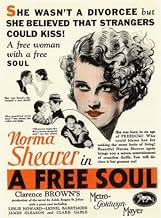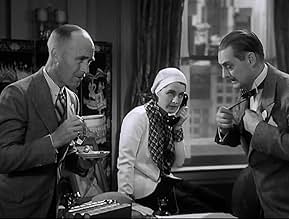PUNTUACIÓN EN IMDb
6,6/10
3,1 mil
TU PUNTUACIÓN
Un abogado alcohólico que defendió con éxito a un notorio jugador acusado de asesinato se opone cuando su hija de espíritu libre se involucra románticamente con él.Un abogado alcohólico que defendió con éxito a un notorio jugador acusado de asesinato se opone cuando su hija de espíritu libre se involucra románticamente con él.Un abogado alcohólico que defendió con éxito a un notorio jugador acusado de asesinato se opone cuando su hija de espíritu libre se involucra románticamente con él.
- Dirección
- Guión
- Reparto principal
- Ganó 1 premio Óscar
- 4 premios y 2 nominaciones en total
Roscoe Ates
- Man Shot at in Men's Room
- (sin acreditar)
Ann Brody
- Hamburger Saleslady
- (sin acreditar)
Edward Brophy
- Slouch
- (sin acreditar)
Clarence Burton
- Detective
- (sin acreditar)
James Donlan
- Reporter
- (sin acreditar)
Bess Flowers
- Birthday Party Guest
- (sin acreditar)
Francis Ford
- Skid Row Drunk
- (sin acreditar)
Henry Hall
- Detective in Raid
- (sin acreditar)
George Irving
- Johnson - Defense Attorney
- (sin acreditar)
Edward LeSaint
- Judge
- (sin acreditar)
Eric Mayne
- Party Guest
- (sin acreditar)
Sam McDaniel
- Casino Valet
- (sin acreditar)
Reseñas destacadas
Some movies are theatrical in the sense that all their values and methods are derived from stage values. This is one.
Some movies are in that sweet spot after talkies got going and before the code was enforced, so they have a vitality that is lacking for a few decades afterwards.
This fits those two overlapping pockets and is a fine example of theatrical acting. The story is simple: a woman from a "fine" family spends time with a gangster for exciting sex. She has an unnatural bond with her "mountebank" father, a drunken lawyer both of which characteristics give him an excuse to be broad in his acting style.
The father forbids the affair and dramatic complications arise. Its an excuse for speechifying, which is done fabulously so long as you understand the tradition. Barrymore is perhaps the last great speechifier in this tradition, though Olivier would hang on for much longer and be celebrated out of nostalgia.
There's an interesting fold in this. The audience has a surrogate on screen, in the jury. Courtroom movies have since this grown into a solid tradition. As the case is made to the jury, it is made to us. This is special because was an early edition of that model, say before Mockingbird and Christie. Because of that, the speechifying to us/jury is fresher, more direct, less burdened with mature movieness.
Ted's Evaluation -- 2 of 3: Has some interesting elements.
Some movies are in that sweet spot after talkies got going and before the code was enforced, so they have a vitality that is lacking for a few decades afterwards.
This fits those two overlapping pockets and is a fine example of theatrical acting. The story is simple: a woman from a "fine" family spends time with a gangster for exciting sex. She has an unnatural bond with her "mountebank" father, a drunken lawyer both of which characteristics give him an excuse to be broad in his acting style.
The father forbids the affair and dramatic complications arise. Its an excuse for speechifying, which is done fabulously so long as you understand the tradition. Barrymore is perhaps the last great speechifier in this tradition, though Olivier would hang on for much longer and be celebrated out of nostalgia.
There's an interesting fold in this. The audience has a surrogate on screen, in the jury. Courtroom movies have since this grown into a solid tradition. As the case is made to the jury, it is made to us. This is special because was an early edition of that model, say before Mockingbird and Christie. Because of that, the speechifying to us/jury is fresher, more direct, less burdened with mature movieness.
Ted's Evaluation -- 2 of 3: Has some interesting elements.
For those of you who did not have the dubious pleasure of seeing one of Elizabeth Taylor's lesser films, The Girl Who Had Everything, here's the original film it was taken from. A Free Soul is the story of a girl who misuses the freedom her father gave her in her upbringing.
The film is based on a story Adela Rogers St. John wrote, that drew from her relationship with her father, famed criminal defense attorney Earl Rogers. Rogers set the mold for the famous criminal attorneys we've seen in action down to today. Unfortunately he was a man with a severe drinking problem which in the end got the better of him.
He did not come from the upper crust that Lionel Barrymore as Stephen Ashe comes from. In fact the real Earl Rogers's father was a minister. Yet Barrymore creates a compelling and brilliant, but dissolute figure who raises his daughter to be broadminded and tolerant and to despise some of the snobs from her class.
Norma Shearer takes the lessons to heart only too well. She leaves stalwart beau, polo playing Leslie Howard, for gambler/racketeer Clark Gable. Gable's a client of Barrymore's who Barrymore got off on a gambit that Johnnie Cochran used successfully defending O.J. Simpson and he's rather full of himself.
Barrymore turns out to be a bit of a snob himself in the end, telling Gable he's not good enough for his little girl. Of course Norma has her own ideas.
This film was the first really big break for Clark Gable. Movie audiences went for his animal magnetism in a big way. Even though Barrymore won the Best Actor Oscar for his performance by virtue of an unforgettable courtroom speech at the finish, it was Gable who got all the newspaper print.
Norma Shearer got a Best Actress nomination, but lost to fellow MGM contract player Marie Dressler for Min and Bill. A Free Soul which was a pre-Code film, explored the theme of sexual satisfaction ever so gingerly, but in a way after 1935 could not be seen for thirty years on the screen. Shearer is also giving one of her best screen performances.
Leslie Howard I'm afraid had real little to do, but look patient and noble as the society polo player. Howard exuded class and distinction even when he's penniless as in The Petrified Forest. So much the better for him when he's dressed in tails.
A Free Soul is light years better than The Girl Who Had Everything and holds up very well for today's audience.
The film is based on a story Adela Rogers St. John wrote, that drew from her relationship with her father, famed criminal defense attorney Earl Rogers. Rogers set the mold for the famous criminal attorneys we've seen in action down to today. Unfortunately he was a man with a severe drinking problem which in the end got the better of him.
He did not come from the upper crust that Lionel Barrymore as Stephen Ashe comes from. In fact the real Earl Rogers's father was a minister. Yet Barrymore creates a compelling and brilliant, but dissolute figure who raises his daughter to be broadminded and tolerant and to despise some of the snobs from her class.
Norma Shearer takes the lessons to heart only too well. She leaves stalwart beau, polo playing Leslie Howard, for gambler/racketeer Clark Gable. Gable's a client of Barrymore's who Barrymore got off on a gambit that Johnnie Cochran used successfully defending O.J. Simpson and he's rather full of himself.
Barrymore turns out to be a bit of a snob himself in the end, telling Gable he's not good enough for his little girl. Of course Norma has her own ideas.
This film was the first really big break for Clark Gable. Movie audiences went for his animal magnetism in a big way. Even though Barrymore won the Best Actor Oscar for his performance by virtue of an unforgettable courtroom speech at the finish, it was Gable who got all the newspaper print.
Norma Shearer got a Best Actress nomination, but lost to fellow MGM contract player Marie Dressler for Min and Bill. A Free Soul which was a pre-Code film, explored the theme of sexual satisfaction ever so gingerly, but in a way after 1935 could not be seen for thirty years on the screen. Shearer is also giving one of her best screen performances.
Leslie Howard I'm afraid had real little to do, but look patient and noble as the society polo player. Howard exuded class and distinction even when he's penniless as in The Petrified Forest. So much the better for him when he's dressed in tails.
A Free Soul is light years better than The Girl Who Had Everything and holds up very well for today's audience.
Johnny Cochrane must've learned some legal tricks from this old movie. For example, at the beginning of the movie, Lionel Barrymore gets Clark Gable acquitted of first degree murder when he places the hat found at the scene of the crime on Clark's head ... clearly the hat is too small. The court and jury laugh, and Clark is set free!
This entire movie was great -- much better than I had expected. I saw two Norma Shearer movies recently with a similar-sounding plot recap: Their Own Desire (Norma Shearer falls for the son of her father's illicit lover), and this one, A Free Soul (Norma Shearer falls for her lawyer father's mobster client). Having watched Their Own Desire first and not being impressed with it, I wondered if I should even bother with A Free Soul. But bother I did, and I'm glad for it. It was an excellent movie.
Lionel Barrymore is the black sheep of his snooty, well-heeled family. His wife died while giving birth to their only child, Jan (Norma Shearer). Being the black sheep, Lionel raised Norma to be a "free soul", to not be afraid of anyone or anything, to not be afraid to make mistakes, and to pick herself up and dust herself off whenever she did find herself in trouble. This has apparently worked well for Norma, until she meets and eventually tries to get away from Clark Gable. Norma finally learns there are consequences to all actions, that one can't be a "free soul" without it having some type of repercussion on one's life.
We also have Lionel Barrymore (whom I always love in anything I see him in) this time very compelling as a brilliant alcoholic lawyer who loves his daughter more than anything but who ultimately doesn't know how to protect her. He disappoints her, and he disappoints himself, but in the end he seeks to right his wrongs by defending Norma's ex-fiancé (to say more would be to possibly spoil the movie).
This movie was fresh, and the characters were sympathetically developed without ever resorting to being maudlin or melodramatic. This movie was also chock-full of great lines. For example:
(Lionel to Clark, upon learning Clark wants to marry Norma) - "The only time I hate democracy is when one of you mongrels forgets where you belong!"
(Norma to Clark, trying to get Clark to quit talking and make love to her) - "Men of action are better in action; they don't talk well."
Great early pre-code movie.
This entire movie was great -- much better than I had expected. I saw two Norma Shearer movies recently with a similar-sounding plot recap: Their Own Desire (Norma Shearer falls for the son of her father's illicit lover), and this one, A Free Soul (Norma Shearer falls for her lawyer father's mobster client). Having watched Their Own Desire first and not being impressed with it, I wondered if I should even bother with A Free Soul. But bother I did, and I'm glad for it. It was an excellent movie.
Lionel Barrymore is the black sheep of his snooty, well-heeled family. His wife died while giving birth to their only child, Jan (Norma Shearer). Being the black sheep, Lionel raised Norma to be a "free soul", to not be afraid of anyone or anything, to not be afraid to make mistakes, and to pick herself up and dust herself off whenever she did find herself in trouble. This has apparently worked well for Norma, until she meets and eventually tries to get away from Clark Gable. Norma finally learns there are consequences to all actions, that one can't be a "free soul" without it having some type of repercussion on one's life.
We also have Lionel Barrymore (whom I always love in anything I see him in) this time very compelling as a brilliant alcoholic lawyer who loves his daughter more than anything but who ultimately doesn't know how to protect her. He disappoints her, and he disappoints himself, but in the end he seeks to right his wrongs by defending Norma's ex-fiancé (to say more would be to possibly spoil the movie).
This movie was fresh, and the characters were sympathetically developed without ever resorting to being maudlin or melodramatic. This movie was also chock-full of great lines. For example:
(Lionel to Clark, upon learning Clark wants to marry Norma) - "The only time I hate democracy is when one of you mongrels forgets where you belong!"
(Norma to Clark, trying to get Clark to quit talking and make love to her) - "Men of action are better in action; they don't talk well."
Great early pre-code movie.
To get an idea of how great magnetic and radiant shearer is here, consider that she matches her scenes with Clark Gable, lionel Barrymore and Leslie Howard and wipes the floor with all of them.
Don't get me wrong they are all very good here but this movie is a star vehicle for shearer and it is her movie. She does all of the shining.
If you appreciate her, this movie is a must see even though the film drags on and the script is average at best.
I wouldn't be surprised if this served as an inspiration to courtroom dramas like Perry Mason and Matlock later on.
A Free Soul (1931)
Clark Gable says, "I'm telling you." And Norma Shearer, dressed in a sexy silk dress, replies, "Oh no, you're not. Nobody is."
That sums up this astonishing movie. I can't believe A Free Soul is so little known, or that so many viewers don't get the depth of its meaning then...and now. Throw in three of the most amazing actors of the early 1930s--Lionel Barrymore, Clark Gable, and Norma Shearer--and you can't help be impressed, and moved, and intrigued. It's about strength of character (three or four characters, in fact). It's about being a modern person, and having modern problems. And it's about facing them, openly, honestly.
So what holds it back? Well, for one thing, it has a lot of talk, a lot of simple dialog about some very not simple things. If you accept the characters and their need to talk, you will see a very honest confrontation with alcoholism, and with what is at first a kind of sex addiction, or what is later developed to be simply unbridled love for a man outside of marriage. But the parallel between two temptations is real, and rather powerful, and the sacrifices each of the two afflicted characters make is intense. Barrymore (as the one nipping the bottle) and Shearer (as the one too much in love, or in love with lovemaking) play their parts perfectly. They have moments of extraordinary clarity, and moments of abandonment. And they confront each other in a way that is completely reasonable.
There are other aspects here worth at least lifting an eyebrow at, namely the very close relationship, almost as platonic lovers, between these two. Gable as a lovable but brutal and deceptive gangster is perfect, too--gorgeous and hard, charming and untrustworthy. The milieu is well developed, from barroom to hotel room to courtroom. This isn't a Warner Brothers knock-you-out crime film, it isn't even Three on a Match, for an example of a compromise between a woman's picture and a gangster flick. It's a heady drama, beautifully laid out and progressively involving, with director Clarence Brown (famous for a whole string of such interpersonal, romantic dramas over several decades) knowing what makes a film really matter.
Clark Gable says, "I'm telling you." And Norma Shearer, dressed in a sexy silk dress, replies, "Oh no, you're not. Nobody is."
That sums up this astonishing movie. I can't believe A Free Soul is so little known, or that so many viewers don't get the depth of its meaning then...and now. Throw in three of the most amazing actors of the early 1930s--Lionel Barrymore, Clark Gable, and Norma Shearer--and you can't help be impressed, and moved, and intrigued. It's about strength of character (three or four characters, in fact). It's about being a modern person, and having modern problems. And it's about facing them, openly, honestly.
So what holds it back? Well, for one thing, it has a lot of talk, a lot of simple dialog about some very not simple things. If you accept the characters and their need to talk, you will see a very honest confrontation with alcoholism, and with what is at first a kind of sex addiction, or what is later developed to be simply unbridled love for a man outside of marriage. But the parallel between two temptations is real, and rather powerful, and the sacrifices each of the two afflicted characters make is intense. Barrymore (as the one nipping the bottle) and Shearer (as the one too much in love, or in love with lovemaking) play their parts perfectly. They have moments of extraordinary clarity, and moments of abandonment. And they confront each other in a way that is completely reasonable.
There are other aspects here worth at least lifting an eyebrow at, namely the very close relationship, almost as platonic lovers, between these two. Gable as a lovable but brutal and deceptive gangster is perfect, too--gorgeous and hard, charming and untrustworthy. The milieu is well developed, from barroom to hotel room to courtroom. This isn't a Warner Brothers knock-you-out crime film, it isn't even Three on a Match, for an example of a compromise between a woman's picture and a gangster flick. It's a heady drama, beautifully laid out and progressively involving, with director Clarence Brown (famous for a whole string of such interpersonal, romantic dramas over several decades) knowing what makes a film really matter.
¿Sabías que...?
- CuriosidadesWhen the mule chases James Gleason, not a stuntman, is knocked down by the animal, a scene which wasn't planned, as Norma Shearer's reaction attests.
- PifiasAfter the cross-examination finishes, Stephen Ashe begins his summation to the jury. However, he is the defense attorney, and the prosecutor takes the first summation. This "factual mistake" is, in fact, not an absolute, as it depends on the state where the trial is held. For example, in a criminal case (which this is) in the Commonwealth of Pennsylvania, the defense goes first and the Commonwealth last. (If it were a civil case in PA, the Plaintiff would go first.)
- ConexionesFeatured in Some of the Best (1944)
- Banda sonoraBy the River Sainte Marie
(1931) (uncredited)
Music by Harry Warren
Played as background music during the restaurant scene
Selecciones populares
Inicia sesión para calificar y añadir a tu lista para recibir recomendaciones personalizadas
- How long is A Free Soul?Con tecnología de Alexa
Detalles
- Fecha de lanzamiento
- País de origen
- Idioma
- Títulos en diferentes países
- A Free Soul
- Localizaciones del rodaje
- Yosemite National Park, California, Estados Unidos(Jan, her father and Eddie go camping)
- Empresa productora
- Ver más compañías en los créditos en IMDbPro
Taquilla
- Presupuesto
- 529.000 US$ (estimación)
- Duración1 hora 33 minutos
- Color
Contribuir a esta página
Sugerir un cambio o añadir el contenido que falta

Principal laguna de datos
What is the Japanese language plot outline for Un alma libre (1931)?
Responde
























